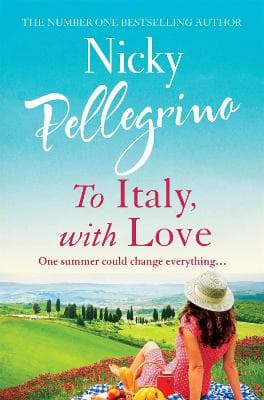Review: To Italy, with Love
Reviewed by Stephanie Johnson
Reviewed by: Stephanie Johnson
Writers of commercial fiction are sometimes heard to complain that they are not taken seriously by the literary establishment, demonstrated both by lack of consideration for literary prizes and by a paucity of serious reviews. Literary writers may counter with the argument that commercial writers enjoy greater sales and higher income, which allows (with possibly irrational but generous logic) for state sponsorship of less-read writers. This has been a tension in the writing world for generations, ever since the establishment of the Queen Elizabeth II Arts Council, precursor to Creative New Zealand.
Nicky Pellegrino is one of New Zealand’s most successful commercial authors, although she is on record for saying that she must persist with her journalism career to remain solvent. Her many novels are read internationally and translated into several languages. Born and raised in Liverpool, Pellegrino enjoyed frequent holidays in Italy with relatives and has visited that country many times since. Most of her novels are set there.
In order to review To Italy, with Love, most critical faculties must be tossed out the window. This is not a book to savour for its language, though it offers many other compensations. It is not a book to search for originality, or ‘the shock of the new,’ or any of the pre-occupations of literary critics since the mid-20th century. The setting is nostalgic – a fictitious small, mountain town in Italy – and characters are archetypal, verging on stereotype. This is not to say that the setting is not enormously enjoyable or the characters likeable. They are.
Central to the narrative are Sarah-Jane and Assunta. Londoner Sarah-Jane is in her early twenties, wronged by the man she loves (who is also her business partner) and on holiday in Italy in an attempt to forget him. Assunta has lived in Montenello all her life. Her age is not specified but her waist is described as “thickened” and her hair as “salt and pepper.” Both women are gifted cooks, Assunta in the rustic Italian tradition and Sarah-Jane more modern European, but with great respect for Italian flavours and methods.
Given that this is a romance novel aimed firmly at a female, heterosexual readership, there are men too, handsome ones. Mechanic Riccardo has a washboard stomach and turquoise eyes, and he is nice. Food entrepreneur Tom Whiffen is dangerously attractive, and he is nasty. Older man Carlo is steady, dependable and still sexy. There is also Baxter, an endearing, adventurous little dog who is accompanying Sarah-Jane on her journey.
Love and food are a heady combination, one that Pellegrino has explored before. In this novel, at least, the writing about food outshines that about sex. There are sentences, which I will resist quoting, which could compete winningly for the Bad Sex in Fiction Award. But then I am being critical again, and that is not what To Italy, with Love is all about. It is about love, colour and sensation, and to be enjoyed without nit-picking. This is Italy before Covid, which Pellegrino consciously avoids, and also perhaps an Italy before it was overrun with tourists, when locals were more willing to help a stranded maiden with a broken-down car and a broken heart. I read it during stressy Week Six of Auckland’s lockdown, picking it up each time with happy anticipation.
Reviewed by Stephanie Johnson
